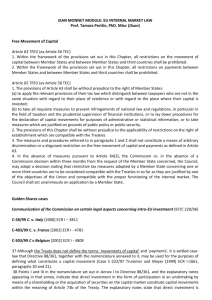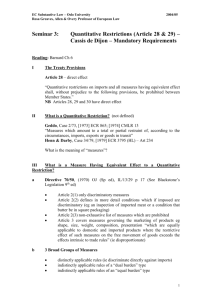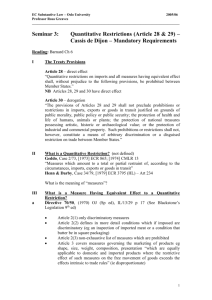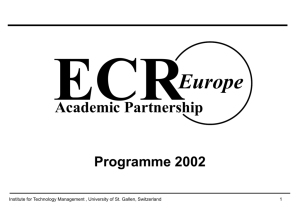The Fundamental Right to Good Administration in its New Attire
advertisement
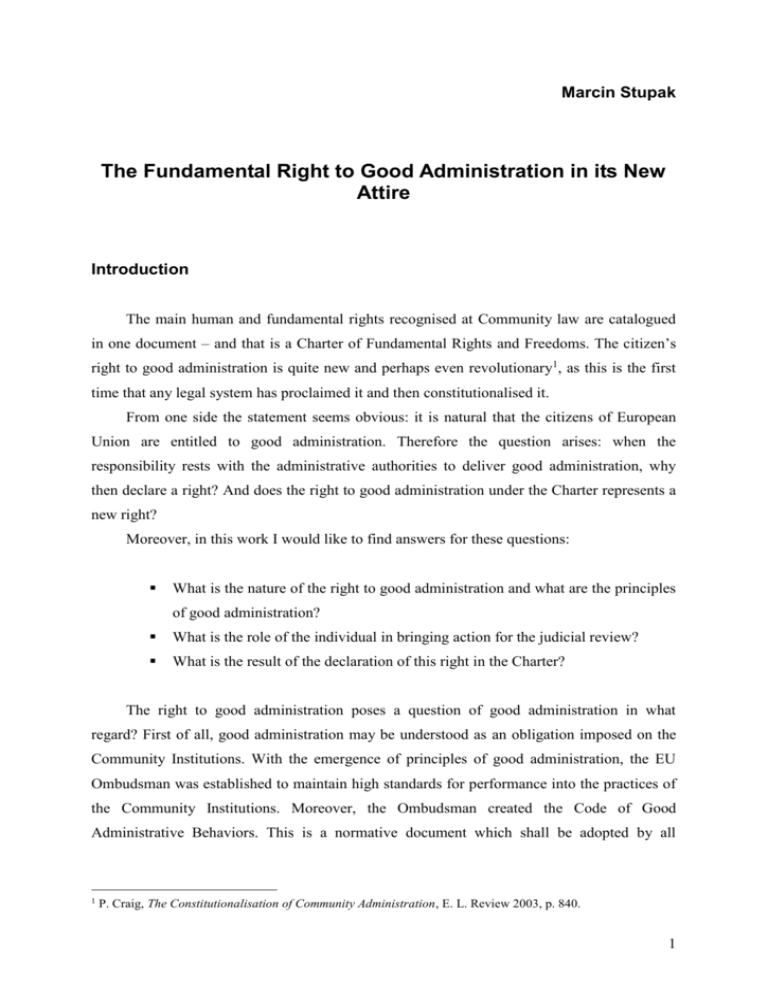
Marcin Stupak The Fundamental Right to Good Administration in its New Attire Introduction The main human and fundamental rights recognised at Community law are catalogued in one document – and that is a Charter of Fundamental Rights and Freedoms. The citizen’s right to good administration is quite new and perhaps even revolutionary1, as this is the first time that any legal system has proclaimed it and then constitutionalised it. From one side the statement seems obvious: it is natural that the citizens of European Union are entitled to good administration. Therefore the question arises: when the responsibility rests with the administrative authorities to deliver good administration, why then declare a right? And does the right to good administration under the Charter represents a new right? Moreover, in this work I would like to find answers for these questions: What is the nature of the right to good administration and what are the principles of good administration? What is the role of the individual in bringing action for the judicial review? What is the result of the declaration of this right in the Charter? The right to good administration poses a question of good administration in what regard? First of all, good administration may be understood as an obligation imposed on the Community Institutions. With the emergence of principles of good administration, the EU Ombudsman was established to maintain high standards for performance into the practices of the Community Institutions. Moreover, the Ombudsman created the Code of Good Administrative Behaviors. This is a normative document which shall be adopted by all 1 P. Craig, The Constitutionalisation of Community Administration, E. L. Review 2003, p. 840. 1 European Institutions. However, the EU Parliament was the only one which adopted the Ombudsman’s code. It must be stated that not all rights have the same character. Some of them have the form of enforceable rights, others operate as imposed duties and some are merely aspirational. What was the purpose of instituted the office of EU Ombudsman? The main factor was to root out maladministration from the Community Institutions. However the concept of maladministration is unclear and undefined in EU law. The Ombudsman has proposed that maladministration can be understood as “the breach of legally-binding rules”. That is a very wide interpretation, which refers both to hard and soft law. What is more, the Ombudsman has no power of redress, and many legal commentators have criticized him for a legalistic approach. The main resource for this work was the monography on good administration written by Jill Wakefield and the litereture there given. Recent cases give an opportunity to follow the Court of Justice way of interpretation. The nature of the right to good administration and the principles of good administration The legitimacy of the European Union remains in the Member States. That means that all activities at european level are valid only as they received the approbation of the citizenry of the Member States2. The crucial principle of the European Union is the adherence to the rule of law. That includes fair and impartial administration procedures. Procedural rules may be identified as the means of securing fundamental rights and the protection of the individual. Adherence to procedural rules is tested principally by the Courts, referred to the Article 230 EC. Under Article 230 EC the Court of Justice was always concerned there is no actio popularis. It is always a balance between ensuring legal certainty and a stable administration. The rule of law generate rights such as a right to a fair hearing, rights to defence, professional privilege, and possibly, the emergent right to proper administration. The Court of First Instance considered the notion of the Commission being “punished” for procedural irregularity3. However, the notion of administrative responsibility is underdeveloped in the European legal order. The Commission operate in a collegiate manner and 2 3 J. Weiler, The Construction of Europe, Cambridge 1999, p. 45 Case T-15/02 BASF AG v. Commission, judgement of 15 March 2006, para. 607. 2 “bear collective responsibility on the political level for all decisions adopted4.” In the action for damages it is Community that incury liability rather than any of its officials. First of all, it must be stated that the features of good administration are not fixed or written down in one document. The only way they can be identified is when the conduct of administration fails to reach an acceptable standard. And this standard varies over time, circumstances and context. The individual rules of which the principle of good administration is comprised have different status and are not of equal importance within a hierarchy of Community rules. While some are no more then rules of conduct, others have achieved the rank of legally-binding obligation. To give an example, the rule that requieres a prompt response from the administrative authorities is actionable only under certain cirsumstances. Some rules comprised in the principle of good administration have been perceived to have compelling nature, even if it was not recognised at the time the Treaties were originally drafted. As an exmple we can give the rule that individuals should have a right of access to documents held by public authorities. It has moved from unenforceable right to an actionable right entrenched in the EC Treaty5. Judical review of the breach of good administration and the role of the individual in bringing action for judicial review What are the aspects of Judical review? Firstly, to uphold the rule of law and to provide an effective remedy. Also important is to ensure the legality of decision-making process. As we may read from the Explanations to the Charter of Fundamental Rights, the principle of good administration was given the force of direct effect. Moreover, it was recognised as a general principle of law by the Court of Justice. Article 230 EC sets the grounds for the Court of Justice, and that is: lack of competence, infringement of essential procedural requirement, infringement of the Treaty or infringement of any rule of law relating to its application or misuse of powers. Adherence to the principles of good administration would operate to prevent breach of the law in any of these situations. And that is, the breach of good administration is implicated 4 5 Case 5/85 AK20 Chemie v. Commission, ECR 2585, para. 30. Article 255 EC inserted by the Treaty of Amsterdam. 3 in all grounds of review but, being a matter of conduct, will not base an action for review except in its legally recognized elements, such as the right to documentation or the right to hearing6. The Council of Europe has characterised judicial review as “the ultimate guarantee of individual rights as well as the rights of the administrative authorities”. In its origin, the Treaty secured no role for the Parliament in legitimating Community action. Later on, the Parliament gained the status of a privileged party and now may be said constitutionally to have the responsibility for ensuring the legality of acts of the EU institutions for the citizenry. However, the right of the individual to bring an action for the review of legality of the acts of the EU institutions retained in the Treaty. Now we shall pose a question what is the purpose for bringing an action for annulment? A well-grounded answer is that, to find not a responsibility but to seek a declaration of illegality. By this, we may consider the role of the individual (in the review action) in two aspects. This first is to protect the interest of the individual. To help monitor output legitimacy, the traditional right to challenge on personal interest. The second, until recently, has been of minor importance. But increasingly the judicial review at the suit of the individual is to regulate the exercise of powers by the administration over the individual. In individual decision there is a supervision which would be difficult to achieve in the absence of an action by the individual7. This is the area in which the principles of good administration may be seen to be widening the scope of judicial review. Above all, as it was mentioned before, when the European Parliament is to represent the interests of individuals there is no intention to give a greater role to the citizen. It means that in all cases the individual concern must be demonstrated, when a natural or legal person in not the addressee of the contested measure8. This test was laid down in the Plaumann ruling: “Persons other than those to whom a decision is addressed may only claim to be individually concerned if that decision: affects them by reasons of certain attributes which are peculiar to them or 6 J. Wakefield, The Right to Good Administration, Kluwer Law 2009, p. 45. J. Wakefield, The Right to Good Administration, Kluwer Law 2009, p. 15. 8 J. Usher, Direct and Individual Concern – an Effective Remedy or a Conventional Solution, E.L. Review 28/2003, p. 580. 7 4 by reasons of circumstances in which they are differentiated from all other person and by virtue of these factors distinguishes them individually just as in the case of the person addressed9.” What is of a great importance, when the Court issued the Plaumann rule, the European Parliament had no effective role in the legislative process and was not yet a representant of the citizens. Moreover, the Court stated that “the provisions of the treaty regarding the right of action of interested parties must not be interpreted restrictively, where the treaty is silent a limitation in this respect may not be presumed”. Relatively recently The Court of First Instance proposed a different interpretation of individual concern in Jego Quere case, however it was rejected by the Court of Justice in the appeal. In this ruling the Commission alleged that the interpretation of individual concern adopted by the Court of First Instance in the contested judgment was so wide as to remove in fact the requirement of individual concern laid down by the fourth paragraph of Article 230 EC. The Court of Justice agreed with this argument and stated that: “the Court of First Instance erred in law by confusing the right to an effective remedy with a general individual direct right to bring proceedings for annulment of general measures, as the fact that the latter is unavailable does not mean that the former does not exist. It is wrong to conclude that the judicial system established by the Treaty can no longer be regarded as guaranteeing persons the right to an effective remedy enabling them to contest the legality of Community measures of general application which directly affect their legal situation, and that, accordingly, the conditions governing the admissibility of an application for annulment should be extended for the benefit of individuals by reconsidering the settled case-law relating to the notion of a person individually concerned according to the fourth paragraph of Article 230 EC10”. As we may see from the judgment, the Court of Justice is very unwilling to wide the scope of individual activity, opposite to the Court of First Instance. The pending question is whether the standard from the 60. should still remain untouched in the European jurisprudence. 9 Case 25/62 Plaumann v. Commission, ECR 95. Case T-177/01, Jego Quere v. Commission, ECR II-2365. 10 5 Adjudication of good administration and Conclusions The Court of First Instance is seen to have the function of providing “protection for natural or legal persons against any unlawful act or omission of a Community Institution11”. The main purpose to establish this court was to improve the quality of judicial protection, as well as to cope with the great increase in the work of the Court of Justice12. It is interesting that the proportion of appellation to the Court of Justice is relatively small, the development of principles of administrative law has been left to the Court of First Instance, as the Court of Justice usually concurs in its decisions. The obligation of good administration is not new to the Community legal system. In early case law, the Court of Justice examined the administrative process to identify failure to achieve good administration through an appraisal of the nature, object and proper operation of the duty performed13. A duty is to be executed in a diligent manner. From the very beginning – in 1961, in the Meroni case we may find the elements of the definition of the diligent execution, and that is: acting within a reasonable time permitting access to information obtaining necessary evidence enabling a party to be heard14. In 1997 the Court of First Instance attempted to make the principal of proper administration binding in the context of the exercise of wide discretionary powers: the guarantees for administrative rights within the Community legal order were stated to be of “ever more fundamental importance”. The Court set out three categories of guarantee: the duty to carefully and impartially examine all the relevant aspects of the individual case, the rights of a person known to be affected to state his views, entitlement to an adequately reasoned decision15. 11 K. Lenearts, Procedural Law of the European Union, London 2006, p.14. J. Fairhurst, Law of the European Union, London 2008, p. 145. 13 J. Wakefield, , The Right to Good Administration, Kluwer Law 2009, p. 34. 14 J. Wakefield, The Right to Good Administration, Kluwer Law 2009, p. 145. 15 Case T-167/94 Detlef v. Council and Commission, ECR II-2589, para. 73. 12 6 At the beginning of the XXI century The Court of Justice has not categorised the right to good administration as a general principle of law. It is important, because at that time the Court declared that the principle of sound administration “does not in itself confer rights upon individuals16”. Later on, in 2006 the Court stated that the only exception is “where it constitutes the expression of specific rights such as the right to have affairs handled impartially, fairly and within a reasonable time, the right to be heard, the right to have access to files, or the obligation to give reasons for decisions, for the purposes of Article 41 of the Carter of Fundamental Rights17”. This is a very narrow interpretation. As J. Wakefield says, “a general right to good administration is not recognised; but some specific rights are recognised at law, standing as discrete rights enforceable without the necessity to refer to a right to good administration18”. In my opinion we may compare this situation with the principle of the “rule of law”. When the courts found essential elements of this principle, such as lex retro not agit or proper vacatio legis there was no need to give the principle of the rule of law as the legal base for the claim. Similar with good administration – when we know what are the particular principles (for example the right to be heard) this can be a sufficient base for our claim. The question arises here – why the legislator decided to distinguish this right in the Charter for Fundamental Rights? One of the reason may be that good administration supports the manner in which constitutional, administrative and regulatory powers are exercised whether in the making of laws or their implementation19. Moreover, good administration requires that the body exercising its act with care and in conformity with operational rules. For a long time the Court has refused to recognise general right to good administration. The reason for this may be the potential conflict between the Community interest as pursued by the Commission and the individual interest in the right to good administration. Was that conservative approach changed by the declaration of this right in the Charter? In my opinion partially, the rulling as Fresh Marine, Angraz and Schneider shows that the Court has extracted purely administrative process from complex decision-making procedure. But this is only a first step on the way. 16 Case T-196/99 Area Cova v. Council and Commission, ECR II-3597, para. 43. Case T-193/04 Hans-Martin Tillack v. Commission, judgement of 4 October 2006, para. 127. 18 J. Wakefield, The Right to Good Administration, Kluwer Law 2009, p. 126. 19 J. Wakefield, The Right to Good Administration, Kluwer Law 2009, p. 223. 17 7 Bibliography P. Craig, The Constitutionalisation of Community Administration, E. L. Review 2003 J. Fairhurst, Law of the European Union, London 2008 K. Lenearts, Procedural Law of the European Union, London 2006 J. Usher, Direct and Individual Concern – an Effective Remedy or a Conventional Solution, E.L. Review 28/2003 J. Wakefield, The Right to Good Administration, Kluwer Law 2009 J. Weiler, The Construction of Europe, Cambridge 1999 Cases Case 25/62 Plaumann v. Commission, ECR 95 Case 5/85 AK20 Chemie v. Commission, ECR 2585 Case T-167/94 Detlef v. Council and Commission, ECR II-2589 Case T-177/01, Jego Quere v. Commission, ECR II-2365 Case T-196/99 Area Cova v. Council and Commission, ECR II-3597 Case T-177/01, Jego Quere v. Commission, ECR II-2365 Case T-15/02 BASF AG v. Commission, judgement of 15 March 2006 Case T-193/04 Hans-Martin Tillack v. Commission, judgement of 4 October 2006 8

